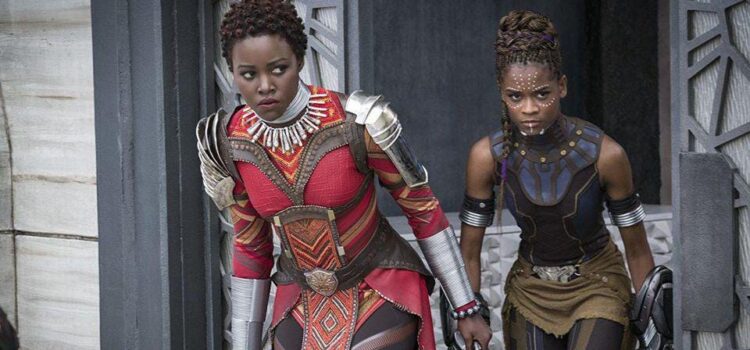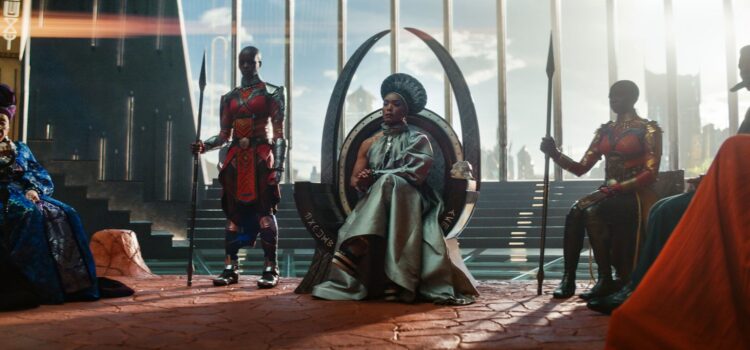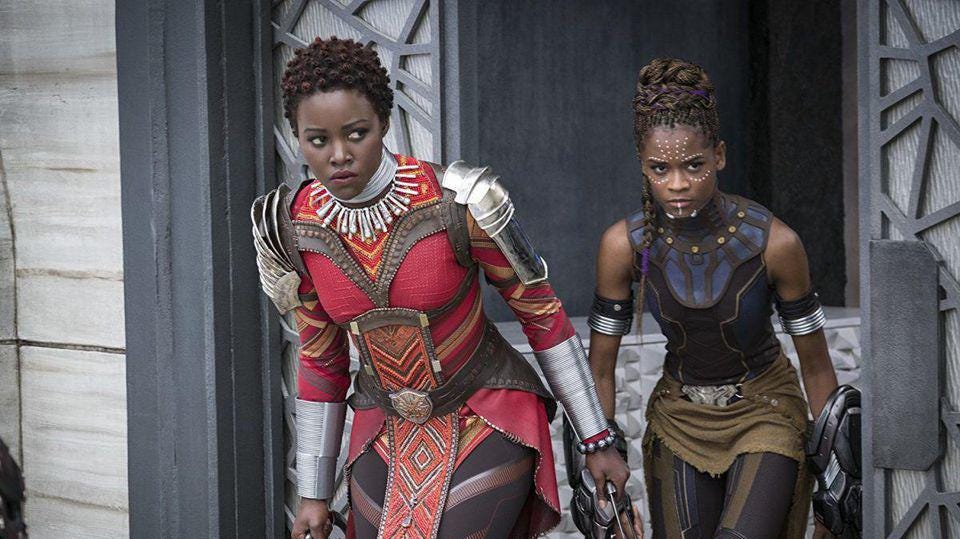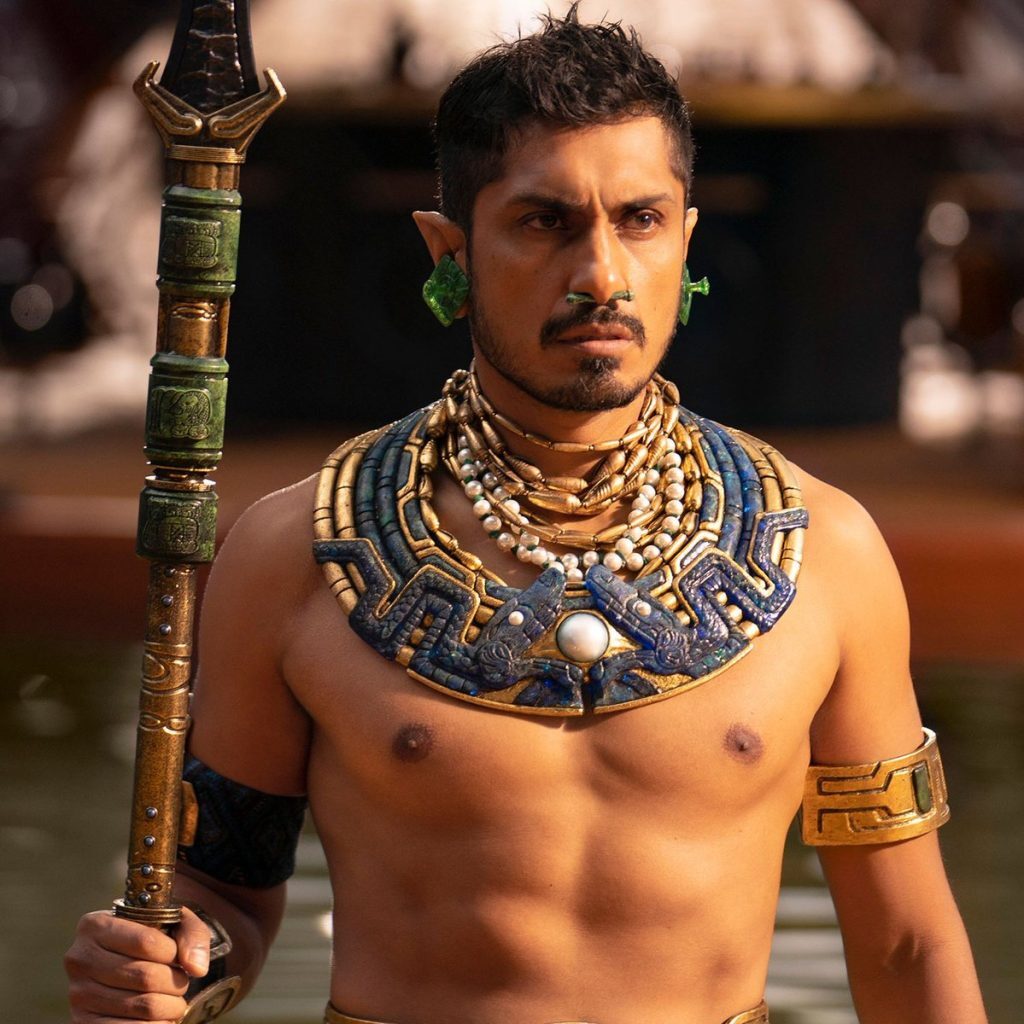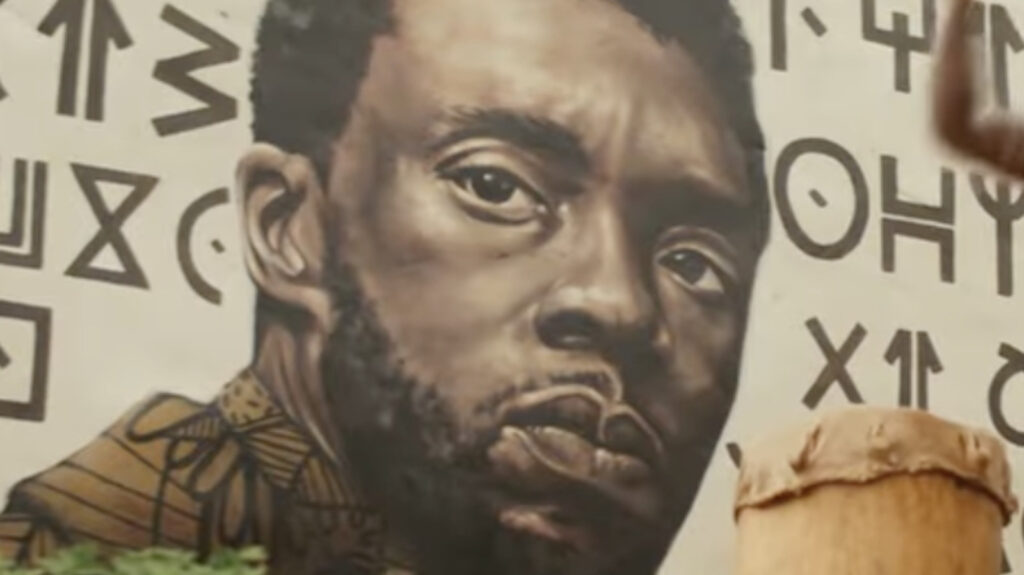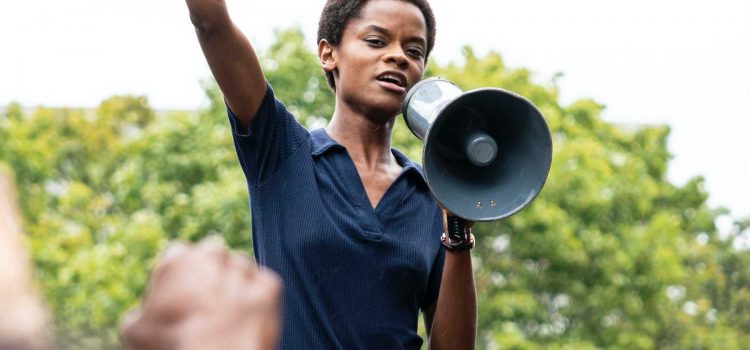By Alex McPherson
Overstuffed and overlong, yet retaining a strong emotional core, director Ryan Coogler’s “Black Panther: Wakanda Forever” ultimately plays it safe, for better and worse.
“Wakanda Forever” faces the difficult task of paying tribute to the late Chadwick Boseman, while continuing the story of Wakanda and its people (along with, of course, setting up future installments and spinoffs). Indeed, Coogler’s film starts off on a solemn note and maintains a decidedly down-beat tone throughout.
T’Challa’s sister, tech-genius Shuri (Letitia Wright), tries and fails to save him, as he succumbs to an unnamed illness. This infuses her sorrow with a sense of guilt, responsibility, and rage. T’Challa’s sudden death casts a long shadow over Wakanda, catching everyone off-guard and sending their nation into a state of uncertainty. Queen Ramonda (Angela Bassett, in a towering, fiery performance) leads the nation through a period of intense mourning. She navigates her own grief and contends with violent geopolitical pressures to share Wakanda’s precious resource, Vibranium — used to fuel Wakandan technology — with the outside world.
However, Wakanda isn’t the only civilization to possess Vibranium. The CIA and US Navy SEALS utilize a newfangled Vibranium-detector to locate some in the Atlantic Ocean — only to be attacked by a group of blue-skinned Mesoamerican warriors called “the Talokan,” who ride into battle on whales, singing melodies that lure victims to their deaths. They’re led by Namor (a formidable, albeit goofy-looking Tenoch Huerta), bare-chested and with wings on his ankles, who is furious that the surface world encroached on his territory. Wakanda is blamed for the attack, and Namor blames Wakanda for revealing the existence of Vibranium to begin with. He issues Ramonda and Shuri an ultimatum — bring him Riri (an amusing though somewhat one-note Dominique Thorne), the Gen-Z MIT student responsible for creating the Vibranium-detector, or Wakanda will be targeted by the Talokan.
All the while, CIA agent and ally of Wakanda Everett Ross (Martin Freeman) learns that the CIA is planning to seize Vibranium to develop weapons for the US military.
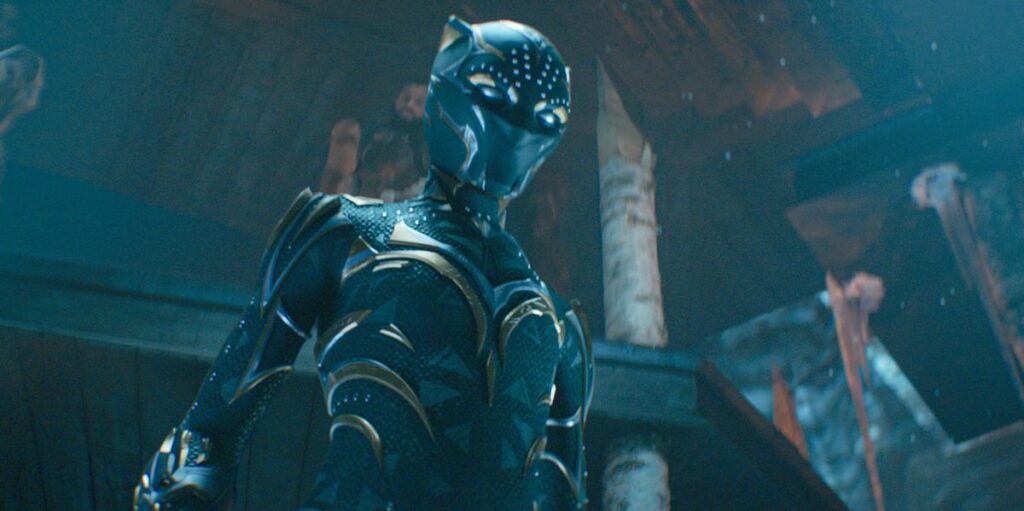
As these various plot threads collide and intersect, the situation gets out of control — leading to plenty of action set pieces, a heavy sprinkling of exposition dumps, and a welcome dollop of melancholic reflection for good measure. “Wakanda Forever” is busy, to say the least, nailing some targets while missing others. Thankfully, Coogler honors Boseman’s memory and his larger cultural impact — foregrounding concepts of loss, acceptance, and hope that shine through otherwise formulaic beats.
Like 2018’s “Black Panther” before it, “Wakanda Forever” establishes a stylistic identity that separates it from other films in the Marvel Cinematic Universe. Wakanda is a vibrant, Afro-futurist metropolis, filmed with clarity and scale by cinematographer Autumn Durald. Inspired by various African cultures, Hannah Beachler’s astounding set design pops off the screen, as do the costumes by Ruth E. Carter, underscoring the characters’ regality and commanding auras, matching the mood of each scene, be it funereal or explosive.
The Talokan’s underwater kingdom is vividly rendered, although heavy on CGI. Still, the Talokan don’t look as formidable as the Wakandan Dora Milaje, led by a fearsome Okoye (Danai Gurira, thankfully given a more defined character arc this time around), who continue to showcase badass weapons and fight choreography like the first film. Ludwig Göransson’s score pulsates with booms and sharp vocals, beautifully complementing the numerous action scenes and lending further gravitas to the powerful, largely women-led ensemble.
The film’s rich tapestry of sights and sounds is matched by effective performances that elevate the proceedings to new dramatic heights. Boseman’s loss is felt acutely here, as viewers can sense the sadness of not only the characters, but also the actors portraying them — particularly Bassett and Wright.
Bassett is the standout here, bringing a fierce, tormented energy to Queen Ramonda that emphasizes the character’s bravery and brashness, a leader facing tough decisions pitting her heart against her head. Shuri is coming to terms with T’Challa’s loss, becoming a valiant leader herself, and reckoning with what kind of legacy she wants to leave behind for Wakanda and the larger world — poignantly acted by Wright, who capably shoulders the film’s quieter sequences and the bombastic ones. Winston Duke provides the bulk of the comedic relief as M’Baku, a burly lad with more depth than expected.
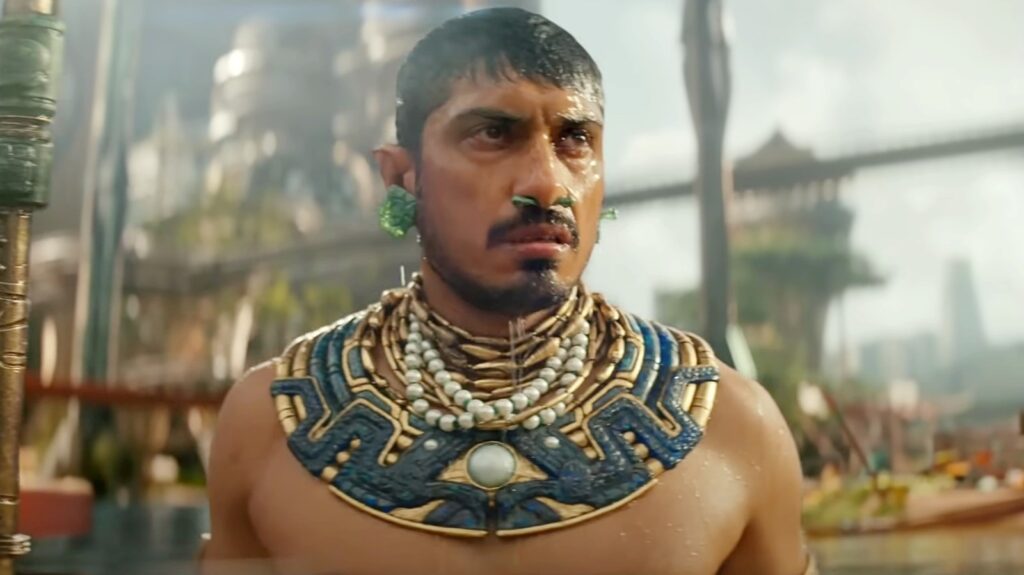
Huerta gives Namor his all, bringing charisma and understated menace to the role. It’s too bad, however, that Namor’s backstory is relegated to rushed exposition. His motivations are understandable — colonial forces wronged him and his Mayan culture long ago, and he will do whatever it takes to protect his people and assert dominance — but don’t hit home with much force. By attempting to make him a sympathetic antihero in such a hurried fashion, “Wakanda Forever” sacrifices nuance, but at least Coogler’s trying to add some complexity to the character.
This issue extends to other elements, too. Even with a gargantuan, 2-hour-and-41-minute runtime, Coogler’s film doesn’t give its numerous plot points enough time to breathe — save for scenes dedicated to honoring and remembering Boseman’s portrayal.
The CIA thread involving Freeman lacks any sort of punch, and the film sidelines the more provocative topic of US imperialism in favor of superhero clichés in the deafening finale. Similarly, the action scenes — except for a thrilling vehicular chase — aren’t especially memorable, overusing weightless CGI and slow-motion to sometimes comical effect. This muddled approach makes “Wakanda Forever” exhausting when it should be thrilling.
But this is an MCU film above all else, and “Wakanda Forever” checks every box that its overcrowded genre dictates. There are glimmers of a truly special, meaningful film that isn’t realized, but Coogler succeeds enough where it counts, and provides a satisfying salute to an impressive world of warriors and a cinema icon lost too soon.
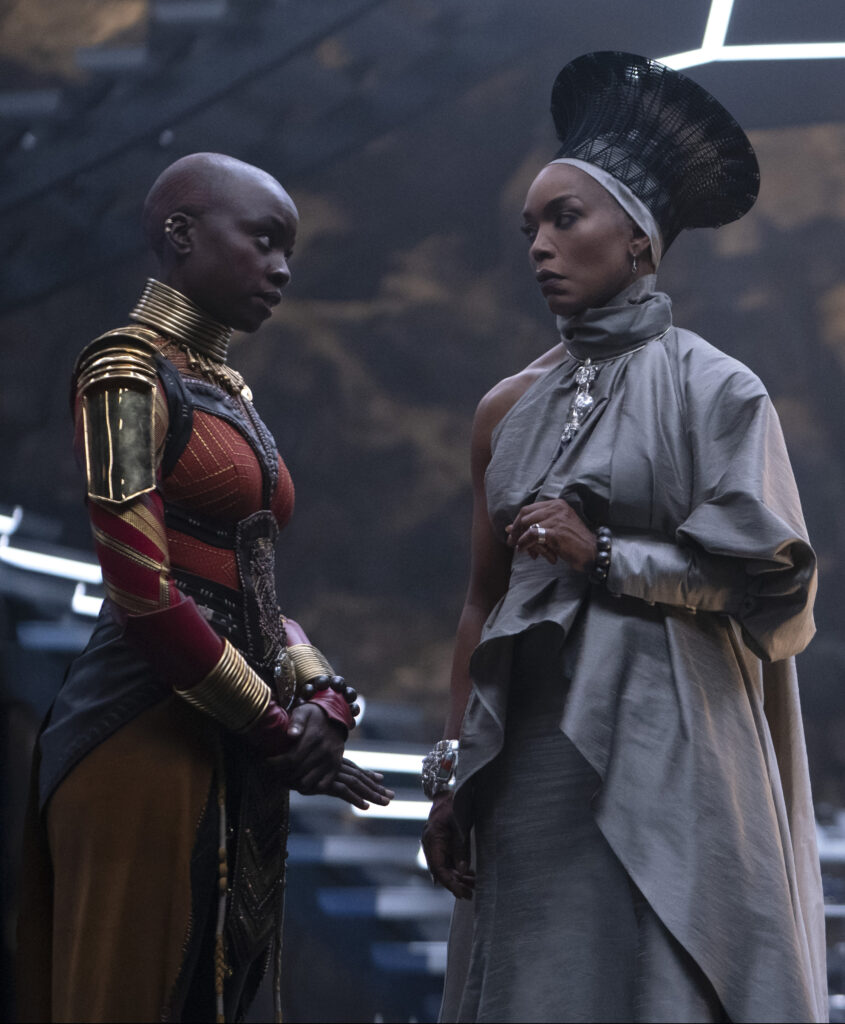
“Black Panther: Wakanda Forever” is a 2022 fantasy action-sci-fi-adventure directed by Ryan Coogler and starring Angela Bassett, Letitia Wright, Tenoch Huerta, Lupita Nyong’o, Danai Gurira, Dominique Thorne and Winston Duke. Rated PG-13 for sequences of strong violence, action and some language, it is 2 hours, 41 minutes’ long. It opened in theatres on Nov. 11. Alex’s Grade: B
Alex McPherson is an unabashed pop culture nerd and a member of the St. Louis Film Critics Association.

